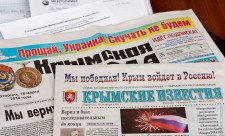Mass communications are in dispiriting conditions in Crimea. Mass media have always been under constant pressure before and after the referendum. Human rights activists announced about threats of physical violence addressed to journalists, ruins of the offices and public abolishment of journalists from the informational field already many times. In period from March to December of 2014, 125 cases of violation of journalist rights have been registered. State officials, law enforcement officers and so called “community defense volunteer squads” are referred to the number of infringers. Are human rights activists and journalist able to influence the situation one year later after the occupation?
Object of encroachment: CrimeaTV
Since occupation of Crimea, journalists of both local and Ukrainian-wide media were exposed to violence, kidnapping and robberies again and again. Only in March, journalistic rights have been violated 85 times. As Pod Pricelom already wrote, the occupation authorities supported the seizure and expropriation of equipment of television and radio company “Chernomorskaya” and the Center for Investigative Reporting. The Crimean Tatar TV channel ATR kept working until recently but the present “authorities” conducted another resonant crime: the TV channel has been searched. The reason was banal: law enforcement officials came to expropriate video data that have been made by the TV channel on February 26, 2014 during the near the State Council of the Crimean Autonomous Republic.
Human rights activists strictly condemned actions of the Russian authorities regarding the mass media. In particular, Olga Skripnik, the chairman of the Center for public education “Almenda” notes that to process any criminal cases regarding events that took place before the annexation is completely illegal: “they (the prosecutor office and investigative agencies) are not embarrassed that they initiated the case because of events that took place on January 26, 2014, in other words, three weeks before the “referendum. Therefore, the events took place on the territory of Ukraine, under jurisdiction of Ukraine and were committed by citizens of Ukraine. It means that only Ukrainian courts can decide if there were any violations,” the human rights activist said.
Object of encroachment: InternetCrimea
Based upon the above mentioned reasons, the Crimean mass media had to continue broadcasting in the Internet. But no such a luck! On June 30, Vladimir Putin signed the law on criminal responsibility for appeals to the extremism in the Internet. Punishment is up to 5 years deprivation of freedom. In other words, it is possible to get to jail for likes, reposts, and shares of information that Crimea is a part of Ukraine and the referendum was illegal.
As for Sevastopol, the Internet mass media have been declared invalid at all there. The editor of the website “Civil defence of Sevastopol” Tatyana Rokhtun paid attention to the mending made by the Legislative Council of Sevastopol: “The Legislative Council of Sevastopol virtually doesn’t cover its own activity. But those news that manage to get on the website attract attention of the media communications. To get rid of that, deputies decided that the online media are not media and should not be given any comments to. A special mending was made, according to which the deputies have no rights to give any comments for the online media. Taking into consideration that almost every newspaper has its own website, then, in the matter of fact, they have rights to give comments only to their own TV channel.” Indeed, on December 30 the “Legislative Council” of Sevastopol adopted the decree on “rules of deputy ethics”, where it is ordered: “a deputy should refrain from estimating and commenting on activities of the deputies and the Legislative Council in the Internet”.
The new rules were implemented just recently, so it is needed to wonder whether the self-declared authorities would like to “train” at encroaching the freedom of speech on a scale of one city in order to apply it to the whole peninsula later on? So far this question remains without any answer.
At the same time, journalists suggest their measures for preservation of independent journalism on the peninsula. For example, Irina Sedova, the editor of the regional network “Gromadske radio”, considers that it is needed to reinforce the activity of the Ukrainian media as much as possible and lay stress on violation of rights: “It has already been half a year since we started to put our project “Rights of Crimeans” into life, we created an online map of rights violations. We consider that these materials should be spread as much as possible. Crimea should not be torn out of the informational space of Ukraine.”
As “Pod Pricelom” already wrote, there was no common recipe to solve the problem of the freedom of speech in Crimea. But one should not forget that when limiting the activity of mass media, the occupants “left alive” Ukrainian TV channels, which are still present in the extensible access in the cable TV networks.













